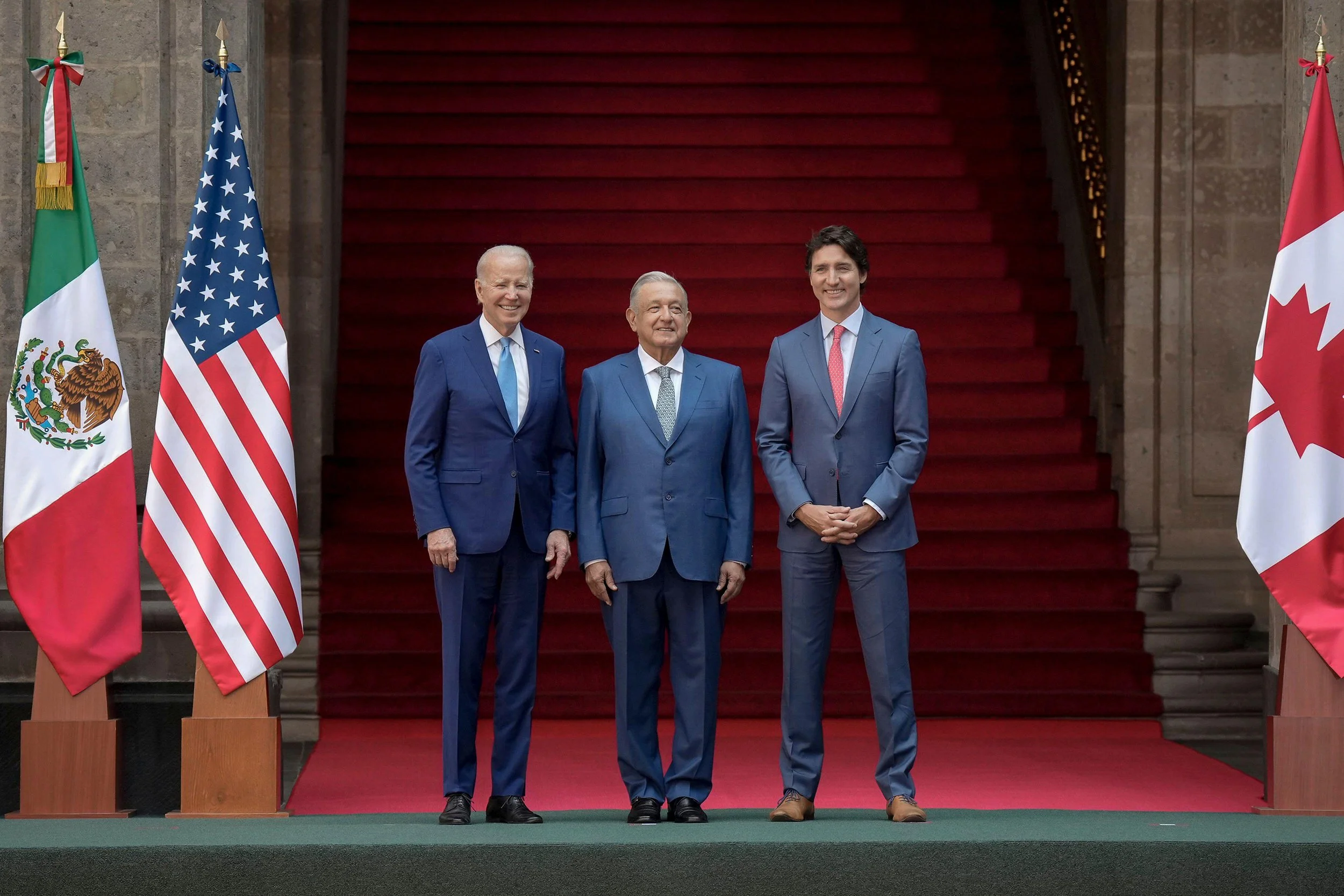Mexico’s foreign policy tested by “toxic readouts” to global partners
AMLO standing with Joe Biden and Justin Trudeau in Mexico City, 2023. Image credit: White House Photo.
President López Obrador (AMLO) continues to alarm international investors on his way out the door. The peso – and Mexican stocks – fell this week. Ratings agency Fitch threatened to lower Mexico’s BBB- credit rating and raise its cost of borrowing further. The drama comes amid growing domestic and international alarm over AMLO’s judicial reforms. These developments threaten incoming President Claudia Sheinbaum’s agenda. They also test AMLO’s philosophy that “the best foreign policy is good domestic policy.”
AMLO has made numerous problematic foreign policy decisions against this backdrop.
Mexico’s Attorney General’s office is investigating El Chapo’s son for treason. The charges overlook drug trafficking. They focus on the kidnapping and extradition to the US of the Sinaloa Cartel leader, El Mayo. There is a legal basis for this; it's still raised eyebrows. That's on the heels of Mexico’s invite to Russian President Putin to Claudia Sheinbaum’s inauguration. Putin is subject to an International Criminal Court arrest warrant. As a signatory to the court, Mexico would be obliged to arrest Putin if he entered the country. AMLO has said Mexico won’t. Meanwhile, Mexico extends diplomatic cover for Venezuela’s dictator Nicholas Maduro.
These actions are damaging Mexico’s global standing according to two Mexican former career ambassadors, each with careers spanning decades in Mexico’s foreign service under numerous Mexican presidencies.
Arturo Sarukhán was Mexico’s Ambassador to the United States during the Obama years. He says, “They think they’re playing geopolitics, but they’re not. They’re creating a very toxic readout and context for Mexico going forward.”
Juan José Gómez Camacho, who worked with AMLO as Mexico’s Permanent Representative to the UN and then Ambassador to Canada, agrees. He sees a specific context, though. “Everything that [historically] informed Mexican foreign policy is about containing imperialism," he explains. "When Mexican political elites think of Venezuela or Cuba, [many] still think intervention, not democracy."
Sarukhán points out AMLO came up in the anti-interventionist years of the PRI’s Echeverría and Portillo. His approach reflects that. It also chimes with the indifference many Mexicans have toward global affairs, which AMLO shares.
AMLO isn't indifferent toward greater US – Mexico integration, though. And he cares about securing his legacy. He knows the judicial reforms have unsettled US policymakers and banks. He knows Sheinbaum needs their confidence to secure and expand his legacy. AMLO doesn’t think his reforms impact the bilateral relationship. But international concern about Mexico goes beyond these reforms. It's compounded by the other problem areas AMLO hasn't addressed.
Mexico’s struggles with organised crime go back decades. Even so, AMLO’s term has seen more of the country ceded to criminal control. At the same time, fentanyl trafficking from Mexico into the US has surged. “Fentanyl brought us to a different level of complexity," says Gómez Camacho. "Because it started to touch, like nothing else, the social fabric of the United States.”
Beyond fentanyl, there's migration. AMLO has struggled with Mexico’s southern border as America has with its. He's played politics with his northern border. US political leaders fear a large-scale terror attack emanating from the southern border. Sarukhán points to eight Uzbeks apprehended, having crossed the border with links to ISIS-K. An attack via the border, he says, “would be the end of the US – Mexico relationship as we’ve known it for three decades.”
Policymakers in the US have greeted Sheinbaum’s election with cautious optimism. But there is a dangerous complacency within Morena. Key figures see Mexico’s position with America as unshakeable because of trade. They’re wrong.
Sheinbaum should turn AMLO's maxim on its head. The best domestic policy is a good foreign policy. She must improve Mexico's international standing to deliver her domestic agenda. Sarukhán is sceptical. He sees Sheinbaum as more ideological than AMLO. Pointing to a dubious spat with Donald Trump, he also questions her instincts.
Gómez Camacho is more hopeful. He thinks Sheinbaum is global and pragmatic. He sees potential in a Harris – Sheinbaum bilateral. Despite his optimism, he also sees danger if she fails to address these issues. “We like to think, no, [the Americans] cannot close supply chains because they would kill themselves,” he says. “It's not true. The day they want to do something, they will do it. Period.”


